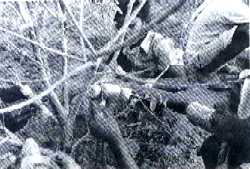Homegrown experts offered for "sale" abroad
 THE PRODUCTS of my research are men, women and children, fully trained to demonstrate the potential power of Mother Earth to retain and use every drop of rain as it falls and where it falls. They are common people but they have a strange power. And, I am determined to let the world know of that power.
THE PRODUCTS of my research are men, women and children, fully trained to demonstrate the potential power of Mother Earth to retain and use every drop of rain as it falls and where it falls. They are common people but they have a strange power. And, I am determined to let the world know of that power.
The products of my research are also two lakh guava trees. They are plants of hope cared for by our rural research students. They are made of earth, water, sun, sky and air and, as such, they are as dear to me as my own body. According to my rough calculations, each tree should yield after eight years an average of 200 kg of fruit per year.
Papayas in a drought Papaya trees grow in our garden-laboratory and their story is the story of the stomach. On one occasion, our research students boldly faced a drought by eating papayas for breakfast, lunch and dinner for four months. We have about two lakh papaya trees in our common pooled land in the 25 Rashtriya Chakriya Vikas Vidyalayas. We work together as one in protecting all our plants.
One day I chided Nirotia, one of my first students and now a local project leader, because she had eaten several kilos of tomatoes, papayas and guavas. I had personally counted 80 fruit on one guava tree and 15 of them on just one branch. It had gladdened my heart beyond words to see such profusion.
"Who is the culprit?" I exploded, but Nirotia shut me up. "Who are you?" she asked. "The land belongs to me and my colleagues. The plants belong to me and my colleagues. We work day and night making all this happen. Yes, we have eaten the fruit. What are you going to do about it?"
I did not say a word in reply. I reconciled myself to the situation and said to myself, "My research students are hungry. There is no harm in eating while working. Fruit and vegetables are meant for people. Let them enjoy the fruit. A time will come when there will be surplus products from our common garden of hope."
The other day, a landlord who is also the chief secretary of Bihar, requested me to plant a papaya tree and 100 mango cuttings on his own land. He agreed that the income from 10 mango plants would go to the Chakriya Vikas Mission fund and he was ready to reconcile himself to getting an annual income from only 30 per cent of the mango plants under the care of our research students. The fact is that the landlord is wise. The market is very close to his land and papayas and mangoes will fetch handsome prices there. Even at Rs 2,000 from each mango plant, he stands to get Rs 60,000 from his small plot every year. So he has no objection to Rs 60,000 going to our research students and the rest of the profits going towards future development projects and the village welfare fund.
The concept of caring and sharing knowledge is clear to each of our rural research students. Take Nirotia, the chief conservator of our common research garden. She knows that the self-regenerating bamboo, the self-propagating jimikand (yam) and a plant known locally in Bihar as gamhar are three products that do not demand any input except simple protection. But together they retain rainfall for how can rain escape when it drops on three-layered crops supported by a half-metre deep trench? Not a drop of rain that falls will escape; not a drop will go waste.
The technology that our research students have learnt can be used to teach our visitors from foreign places like the US, the UK, Sweden and Hungary. Why should the people in these countries spend time, money and energy unnecessarily cultivating their fields? I can "sell" our knowledge to them by sending them our research students. The policy of mutual self-reliance needs to be sold to all the countries of the world, whose people are suffering from the harm they have done to their air, water and land.
(P R Mishra is patron, Chakriya Vikas Pranali, Bihar)
